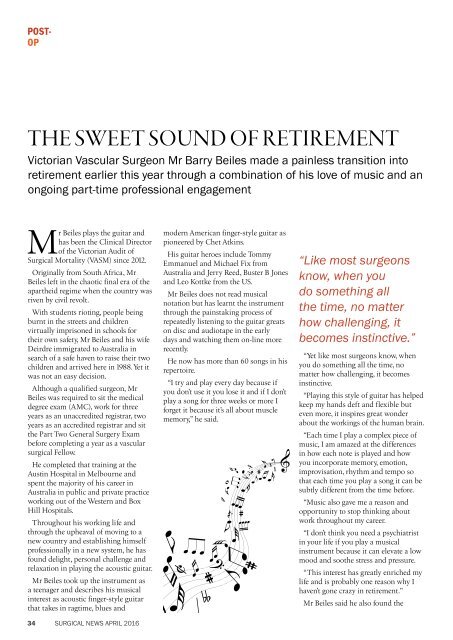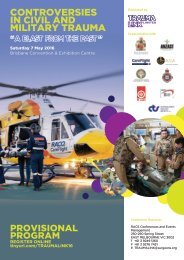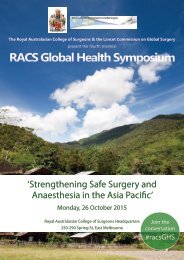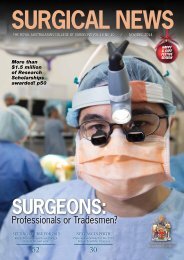Create successful ePaper yourself
Turn your PDF publications into a flip-book with our unique Google optimized e-Paper software.
POST-<br />
OP<br />
POST<br />
OP<br />
THE SWEET SOUND OF RETIREMENT<br />
Victorian Vascular Surgeon Mr Barry Beiles made a painless transition into<br />
retirement earlier this year through a combination of his love of music and an<br />
ongoing part-time professional engagement<br />
Mr Beiles plays the guitar and<br />
has been the Clinical Director<br />
of the Victorian Audit of<br />
Surgical Mortality (VASM) since 2012.<br />
Originally from South Africa, Mr<br />
Beiles left in the chaotic final era of the<br />
apartheid regime when the country was<br />
riven by civil revolt.<br />
With students rioting, people being<br />
burnt in the streets and children<br />
virtually imprisoned in schools for<br />
their own safety, Mr Beiles and his wife<br />
Deirdre immigrated to Australia in<br />
search of a safe haven to raise their two<br />
children and arrived here in 1988. Yet it<br />
was not an easy decision.<br />
Although a qualified surgeon, Mr<br />
Beiles was required to sit the medical<br />
degree exam (AMC), work for three<br />
years as an unaccredited registrar, two<br />
years as an accredited registrar and sit<br />
the Part Two General Surgery Exam<br />
before completing a year as a vascular<br />
surgical Fellow.<br />
He completed that training at the<br />
Austin Hospital in Melbourne and<br />
spent the majority of his career in<br />
Australia in public and private practice<br />
working out of the Western and Box<br />
Hill Hospitals.<br />
Throughout his working life and<br />
through the upheaval of moving to a<br />
new country and establishing himself<br />
professionally in a new system, he has<br />
found delight, personal challenge and<br />
relaxation in playing the acoustic guitar.<br />
Mr Beiles took up the instrument as<br />
a teenager and describes his musical<br />
interest as acoustic finger-style guitar<br />
that takes in ragtime, blues and<br />
modern American finger-style guitar as<br />
pioneered by Chet Atkins.<br />
His guitar heroes include Tommy<br />
Emmanuel and Michael Fix from<br />
Australia and Jerry Reed, Buster B Jones<br />
and Leo Kottke from the US.<br />
Mr Beiles does not read musical<br />
notation but has learnt the instrument<br />
through the painstaking process of<br />
repeatedly listening to the guitar greats<br />
on disc and audiotape in the early<br />
days and watching them on-line more<br />
recently.<br />
He now has more than 60 songs in his<br />
repertoire.<br />
“I try and play every day because if<br />
you don’t use it you lose it and if I don’t<br />
play a song for three weeks or more I<br />
forget it because it’s all about muscle<br />
memory,” he said.<br />
“Like most surgeons<br />
know, when you<br />
do something all<br />
the time, no matter<br />
how challenging, it<br />
becomes instinctive.”<br />
“Yet like most surgeons know, when<br />
you do something all the time, no<br />
matter how challenging, it becomes<br />
instinctive.<br />
“Playing this style of guitar has helped<br />
keep my hands deft and flexible but<br />
even more, it inspires great wonder<br />
about the workings of the human brain.<br />
“Each time I play a complex piece of<br />
music, I am amazed at the differences<br />
in how each note is played and how<br />
you incorporate memory, emotion,<br />
improvisation, rhythm and tempo so<br />
that each time you play a song it can be<br />
subtly different from the time before.<br />
“Music also gave me a reason and<br />
opportunity to stop thinking about<br />
work throughout my career.<br />
“I don’t think you need a psychiatrist<br />
in your life if you play a musical<br />
instrument because it can elevate a low<br />
mood and soothe stress and pressure.<br />
“This interest has greatly enriched my<br />
life and is probably one reason why I<br />
haven’t gone crazy in retirement.”<br />
Mr Beiles said he also found the<br />
transition into retirement smoothed<br />
through his ongoing role at the VASM<br />
and said he took up the position of the<br />
Clinical Director as a way to give back<br />
to the Australian surgical profession.<br />
A collaborative program between the<br />
Victorian Government’s Department<br />
of Health, the Victorian Surgical<br />
Consultative Council and the RACS, the<br />
VASM exams the deaths of all patients<br />
who have died in a Victorian hospital<br />
while under the care of a surgeon.<br />
Under the Victorian system, each such<br />
death is notified to the VASM by the<br />
hospital involved. The circumstances<br />
are then reflected upon by the treating<br />
surgeon and peer reviewed by at least<br />
one surgeon practicing in the same<br />
specialty but from a different hospital<br />
who is unaware of the identity of the<br />
treating surgeon.<br />
The findings are then considered by,<br />
and reported on, by the VASM in regular<br />
reports, booklets and seminars.<br />
Mr Beiles said the VASM was not a<br />
punitive program, but an educational<br />
tool which provides data and case<br />
studies through its Annual Report,<br />
Seminars and Casebook publications.<br />
“The data in Victoria shows that there<br />
has been a steady, year by year decrease<br />
in surgical mortality, a result that is not<br />
necessarily replicated across Australia,”<br />
he said.<br />
“This reduction is particularly pleasing<br />
given that the patients who make up<br />
the majority of cases referred to us are<br />
elderly patients with co-morbidities who<br />
are admitted into hospital as emergency<br />
cases.<br />
“We know that the standard of<br />
surgical care in Victoria is very high,<br />
that audits act to support that standard<br />
and we now have years of data to prove<br />
it.<br />
“We now also know that the top three<br />
aspects of surgical care that can reduce<br />
surgical mortality are preventing delay<br />
in diagnosis or transfer, the management<br />
of the deteriorating patient and surgical<br />
emergencies, and shared care.”<br />
Mr Beiles and his wife Deidre have<br />
returned to South Africa every two years<br />
since their arrival in Australia to visit<br />
family.<br />
He has watched the transformation of<br />
his homeland with hope and optimism<br />
from the calm of Australia and said he<br />
was there when Nelson Mandela was<br />
commemorated.<br />
He has also visited Robben Island<br />
where the South African leader was<br />
incarcerated for 16 years.<br />
Mr Beiles described both experiences<br />
as greatly moving.<br />
Now a grandfather of four children, he<br />
said he was keen to pass on the joy and<br />
stimulation of music to the youngest<br />
members of the Beiles family.<br />
“I made a resolution a while ago that I<br />
would encourage my grandchildren to<br />
learn to play a musical instrument so<br />
I plan to give each grandchild a guitar<br />
when they turn eight years old,” he said.<br />
With Karen Murphy<br />
34 <strong>SURGICAL</strong> <strong>NEWS</strong> APRIL 2016 <strong>SURGICAL</strong> <strong>NEWS</strong> APRIL 2016 35






